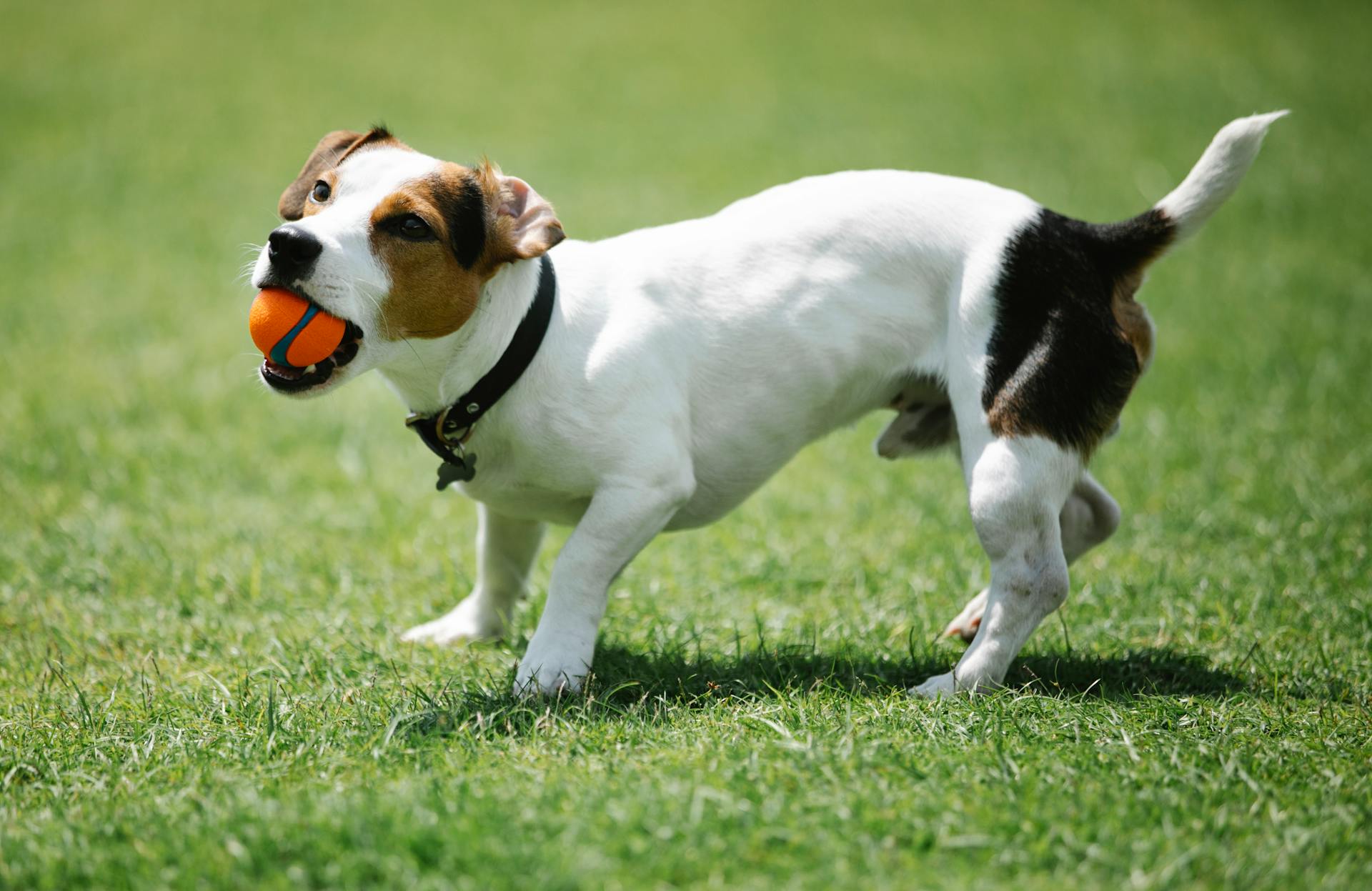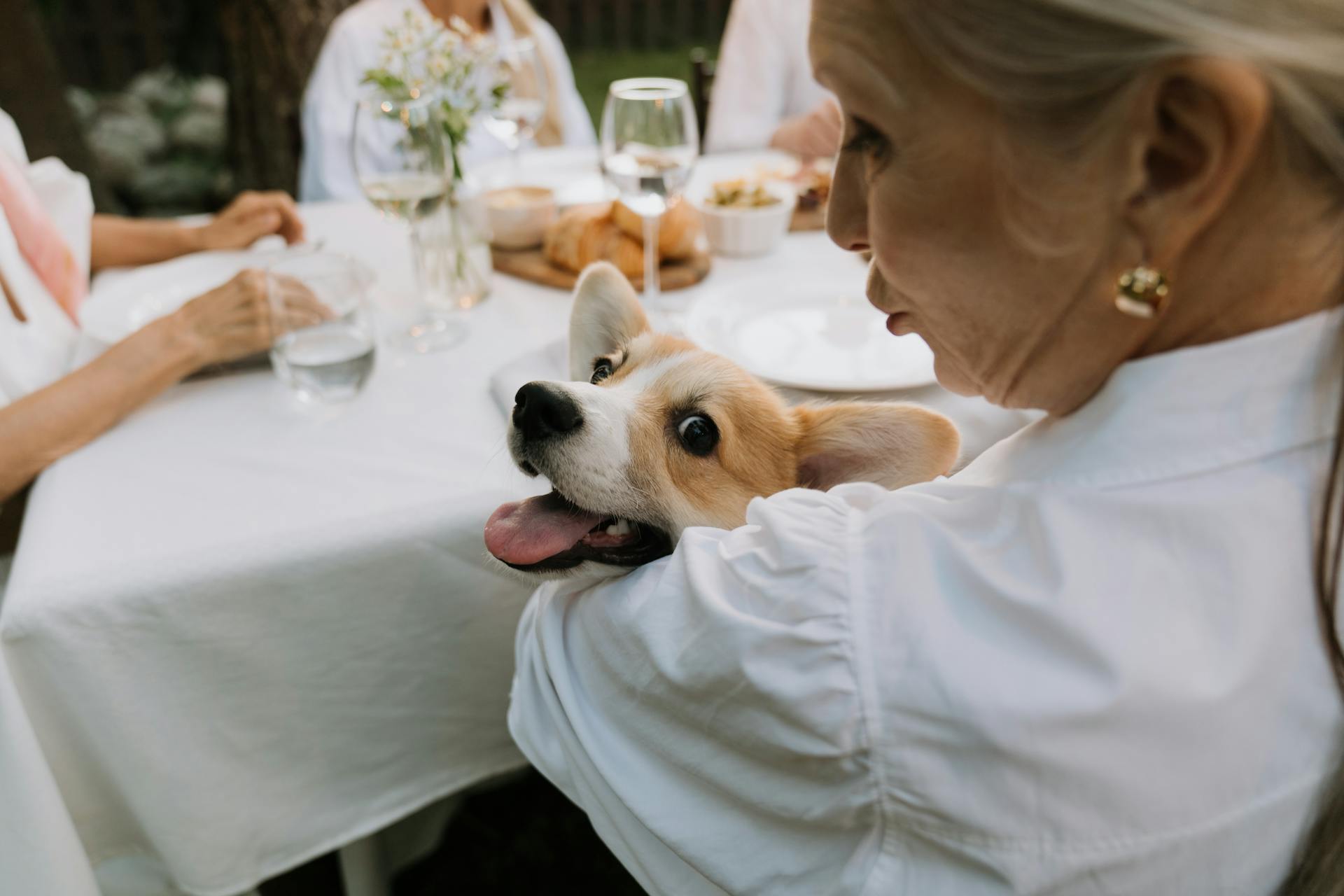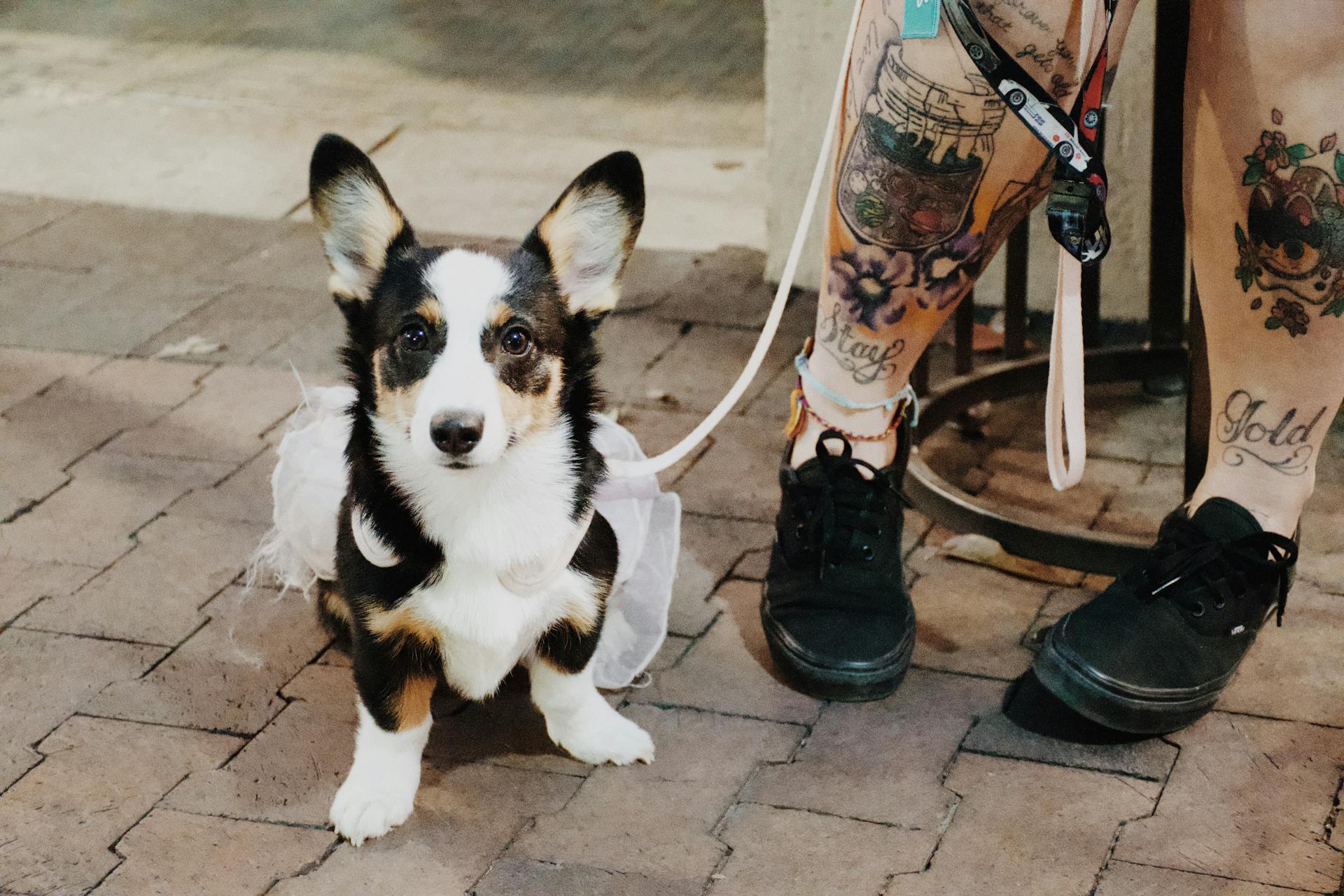
Miniature Corgis are a beloved breed known for their short stature and big hearts. They typically weigh between 25-38 pounds and stand between 10-14 inches tall.
One of the most distinctive features of the Miniature Corgi is their short legs and long body. This unique body type can make them prone to back problems if they're not handled carefully.
Miniature Corgis are highly intelligent and active dogs that require regular exercise to stay happy and healthy. They thrive on daily walks and playtime.
Their short coats require minimal grooming, making them a great choice for busy owners.
Types of Miniature Corgis
There are several types of miniature corgis, each with unique characteristics. The Pembroke Welsh Corgi is one of the most common types of miniature corgis, known for its short stature and long body.
The Cardigan Welsh Corgi is another type of miniature corgi, recognized by its distinctive tail and larger size compared to the Pembroke Welsh Corgi. This breed is also known for its intelligence and energetic personality.
The Teacup Corgi is a smaller version of the Pembroke Welsh Corgi, weighing around 10 pounds or less. However, the American Kennel Club does not recognize the Teacup Corgi as an official breed.
You might like: Different Breeds of Corgis
Pembroke vs Cardigan Welsh Corgis
The Pembroke Welsh Corgi is the more popular of the two breeds, recognized by the American Kennel Club.
They can be identified by their shorter docked tail and pointed ears.
Pembroke Welsh Corgis stand 10-12 inches at the shoulder and typically weigh 25-30lbs.
Their smaller size makes them a great fit for families with smaller living spaces.
Personality-wise, the Pembroke Welsh Corgi is often described as more outgoing and playful, making them a great addition to active families.
Suggestion: Welsh Corgi Pictures
Mixing Small Dog Breeds
Mixing small dog breeds is a common practice, but it's often done unethically by breeders trying to produce "designer" dogs.
These dogs can be referred to as "corgi poms" or "chi corgis" when mixed with a Chihuahua or Pomeranian.
Breeders may mix normal corgis with smaller breeds like Chihuahuas to produce smaller-sized corgis.
This practice is often done to produce "teacup dogs" that are advertised as "Mini Corgis" or "Teacup Corgis".
Unsuspecting puppy buyers may fall for these ads, but what they don't realize is that these dogs may suffer from serious health complications like liver shunts.
Breeding runts is a common practice used by breeders attempting to produce "mini corgi puppies".
It's essential to be aware of these practices when looking for a miniature corgi puppy.
Reputable breeders will not advertise their puppies as "teacup" or "mini" to mislead buyers.
Curious to learn more? Check out: Dog Breeders Coton De Tulear
What Makes a Miniature Corgi
So, what makes a Miniature Corgi? Well, it's not just a matter of size. There are several potential reasons for a "Mini Corgi" to be significantly smaller than the breed standard.
One reason is that the parent dogs may be smaller than average. Another reason is that the breeder may have selectively bred the dogs to be smaller.
Miniature Corgis can also be the result of cross-breeding with other small breeds, which can lead to a smaller overall size.
Breeding and Ownership
Miniature corgis are a popular breed, but they can be expensive to purchase from a reputable breeder. A well-bred puppy can cost anywhere from $1,000 to $5,000.
To ensure you're getting a healthy puppy, research the breeder thoroughly and ask for health clearances on the parents. This can save you from costly veterinary bills down the road.
Miniature corgis are a relatively small breed, but they still require regular exercise to stay happy and healthy. A daily walk and playtime should be a part of your routine.
Expand your knowledge: Are Corgis Healthy
Mini Breeder
Some unethical breeders and puppy mills produce smaller-sized corgis for financial gain by mixing normal corgis with smaller breeds like Chihuahuas.
They often prey on undereducated buyers by advertising these puppies as "Mini Corgis" or "Teacup Corgis."
These "teacup dogs" may suffer from serious health complications like liver shunts.
As a buyer, make sure you're getting a healthy, well-bred dog from a reputable breeder.
Mini Corgis can be the result of breeding normal corgis with smaller breeds.
Teacup Corgis are not produced by ethical breeders.
If you see a breeder advertising a "Mini Corgi Puppy" or a "Teacup Puppy", they may be trying to sell smaller-than-average Corgis with health problems.
Teacup Corgis can make great family pets if socialized and exposed to other animals.
They tend to get along well with both young children and older people.
Intriguing read: Min Pin Breeders
Adopt vs. Buy a Pet
If you're in the market for a new pet, it's essential to consider adopting versus buying. Irresponsible breeders and puppy mills often use gimmicks like "mini corgi" or "teacup corgi" to sell mixed-breed or health-compromised puppies.
Buying from an ethical breeder is a better option if you're looking for a purebred pet. However, even then, it's crucial to research the breeder thoroughly.
If you're not set on a specific breed, consider adopting from a shelter or rescue organization. You'll not only be giving a loving home to a deserving animal, but you'll also be saving a life.
Regular corgis, also known as standard corgis, are a great breed for many families, but they may not be well-suited for every home. If you're unsure, consider another breed that fits your lifestyle better.
Adopting a pet can be a more cost-effective option, as the adoption fee is often lower than the cost of buying from a breeder.
Methods Not Always Ethical
Some breeders use inbreeding to produce smaller corgis, which can lead to health problems in the puppies.
Inbreeding is a breeding practice where two closely related dogs are bred together, which can result in a higher risk of inherited health issues.
On a similar theme: Corgis Health Issues
Unethical breeders may also malnourish their dogs to stunt their growth and create a smaller appearance.
This can lead to serious health complications in the puppies, such as liver shunts.
Breeders who use these practices to produce "mini corgis" or "teacup corgis" are often more interested in making a profit than in the health and well-being of the dogs.
These puppies may be the result of mixing normal corgis with smaller breeds such as Chihuahuas.
You should be wary of breeders who advertise their puppies as "mini corgis" or "teacup corgis" because they may be trying to sell mixed-breed or health-compromised puppies.
If you're considering buying a corgi puppy, make sure you're getting a healthy, well-bred dog from a reputable breeder.
A fresh viewpoint: Bedlington Terrier Breeders
Health and Care
Health and care is a top priority for miniature corgis. Regular veterinary check-ups are essential to ensure your pup stays healthy.
A lack of proper nutrition during development can make miniature corgis smaller and more prone to skeletal issues, general poor health, and a shorter life expectancy. This is why feeding a balanced diet is crucial.
Some miniature corgis may be born with health concerns such as a liver shunt that stunts their growth. If your pup fails to grow at the same rate as its littermates, it's essential to have a veterinarian examine them to rule out any health issues.
While miniature corgis are generally healthy, they can be prone to certain health conditions. Here are some potential issues to watch out for:
- Hip dysplasia
- Degenerative myelopathy
- Progressive retinal atrophy
- Von Willebrand’s disease
- Intervertebral disc disease
Health Issues
Health Issues can be a concern for Corgis, and it's essential to be aware of the potential problems they may face. Some smaller puppies may have health concerns such as a liver shunt that stunts their growth.
Regular check-ups with a veterinarian are crucial to ensure that any health issues are caught early on. A puppy that fails to grow at the rate of its littermates should be examined by a veterinarian to rule out any health issues.
Some common health issues facing Corgis include hip dysplasia, which can cause arthritis and mobility problems. Degenerative myelopathy, a progressive disease that affects the spinal cord, is also a concern.
You might like: Do Corgis Have Back Problems

While Corgis are generally a healthy breed, certain health conditions can arise. These include progressive retinal atrophy, which can lead to blindness, and Von Willebrand's disease, a bleeding disorder.
Here are some of the most common health issues facing Corgis:
- Hip dysplasia
- Degenerative myelopathy
- Progressive retinal atrophy
- Von Willebrand’s disease
- Intervertebral disc disease
It's essential to make veterinarian care a priority to ensure that developing health problems are caught early enough to address them before they become too serious or dangerous.
Nutrition
A well-balanced diet is crucial for your Mini Corgi's overall health and well-being. Nutrition plays a significant role in proper growth and development, and a lack of proper nutrition can lead to smaller size and other problems like skeletal issues and general poor health.
Your Mini Corgi should eat a diet high in protein and low in salt and simple carbohydrates. Commercial dog food specifically designed for small breeds will ensure they get all the necessary nutrition for good health and a high quality of life.
A unique perspective: How High Can Corgis Jump

Adult Mini Corgis need between 1 and 2 cups of food each day, depending on their activity level and health condition. A veterinarian can provide personalized recommendations for their specific needs.
It's essential to choose the right dog food for your Mini Corgi, as a poor diet can have serious consequences for their health.
You might like: Best Homemade Food for Corgis
Pregnancy Can Be Challenging
Pregnancy can be challenging for teacup Corgis due to the pressure it puts on their tiny bodies.
A difficult birth, or dystocia, is common in teacup Corgis, making it crucial for owners to learn the signs of dystocia in dogs.
Many teacup Corgi mothers require cesarean sections, which can be a serious and costly medical procedure.
To take precautions, owners should find out in advance where the nearest emergency veterinary hospital is.
A unique perspective: Are Corgis Good for First Time Owners
Easier to Manage
Owning a small dog may seem like a convenient option, but size shouldn't be the main factor in choosing a breed.

Smaller dogs still require proper exercise and training, just like their larger counterparts.
Decreasing a dog's physical size doesn't necessarily decrease their energy level or need for exercise and stimulation.
Smaller dogs can suffer from the same behavioral and health issues as larger dogs if not given proper attention.
It's essential to remember that proper care and attention are crucial for a dog's well-being, regardless of their size.
Check this out: Do Corgis Need a Lot of Exercise
Grooming Needs
Miniature corgis need regular brushing to keep their coats clean and healthy. They shed heavily during seasonal transitions, so daily brushing is essential to remove loose hair.
You'll want to brush their teeth a few times a week to prevent dental issues.
Trimming their nails monthly is also crucial to prevent overgrowth.
Brushing their coat is a great opportunity to check their ears for any signs of infection or irritation.
Unique Aspects
People may think that by owning a "Mini Corgi", they are unique or special for owning a smaller version of the breed.
Corgis are already adorable dogs, and a smaller version may be even more appealing to some.
A "Mini Corgi" can be a great conversation starter, and some people may find it a fun way to stand out from the crowd.
Novelty Factor

Owning a "Mini Corgi" can be appealing to some because Corgis are already adorable dogs, and a smaller version may be even more appealing to some.
People may think that by owning a "Mini Corgi", they are unique or special for owning a smaller version of the breed.
The novelty factor of owning a "Mini Corgi" can be a double-edged sword, as it may lead to unrealistic expectations about the dog's size or temperament.
5 Unique Facts
In the world of unique aspects, there's one thing that stands out - the fact that some of the most fascinating things on Earth are actually formed by natural processes like erosion, which can take millions of years to shape a single rock into something truly unique.
The Grand Canyon, for example, is a testament to this process, with its layered rock formations telling a story of the region's geological history.
Some of the most unique aspects of the natural world are found in the world's oceans, where underwater volcanoes can create entirely new landmasses.

The Mariana Trench, the deepest point in the ocean, is a staggering 36,000 feet deep and is home to an incredible array of unique marine life that can be found nowhere else on Earth.
The world's largest living organism, the Armillaria ostoyae fungus, covers over 2,200 acres in Oregon and is estimated to be around 2,400 years old.
Frequently Asked Questions
How much does a teacup Corgi cost?
A teacup Corgi typically costs between $2,000 to $5,000 or more, due to their rarity and selective breeding. Prices may vary depending on factors like breeder reputation and bloodline.
Do Pembroke Welsh corgis stay small?
Pembroke Welsh Corgis are a medium-sized breed, typically weighing 30 pounds and standing 10-12 inches tall. While they may not be considered a small breed, they are still a compact and sturdy dog.
Are there miniature Welsh corgis?
There is no recognized breed of miniature Welsh Corgis, but naturally small Corgis can occur through breeding with smaller breeds like Chihuahuas. These "Mini Corgis" are not a distinct breed, but rather a variation of the traditional Welsh Corgi.
How big does a mini Corgi get?
A miniature Corgi typically stands 10-12 inches tall and weighs up to 5 pounds.
How much does a miniature Corgi cost?
A miniature Corgi, also known as a teacup Corgi, typically costs between $2,000 to $2,500 in the US. Prices may vary depending on factors like coat color and lineage.
Featured Images: pexels.com


